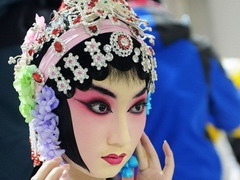China, white faces and expertise
By Nicolas Santo (chinadaily.com.cn) Updated: 2014-09-17 10:12If a Korean walks onto a stage and quotes Confucius: “Guó jiā xīng wáng pǐ fū yǒu zé” while giving a speech to a Chinese audience, it probably would be no big deal. But if a German addresses that same audience and just says: “Dà jiā hǎo”, once he finishes his presentation, everybody will congratulate him for his “great” Mandarin.
Many of us have experienced a situation like that. It is no news that white foreigners living in China enjoy preferential treatment. The unfairness of this, however, can be exasperating – not only to Chinese people, but also non-white foreigners. It also frustrates white foreigners who believe that, no matter where you live, success is the result of personal and professional excellence, not having blue eyes and pink cheeks.
|
 |
| Beijing to tighten foreign hiring requirements |
Things were not always like this. Edward Hume, an American physician who in 1906 founded a hospital associated with Yale University in Changsha, described in his autobiography the reaction of locals to the appearance of foreigners on the streets of Hunan’s capital: “Mothers pushed their little children behind them as they saw us coming, to hide them from the ‘evil eye’. Some held their noses as we passed. The amah told us once that the smell of the Westerner was so characteristic that Chinese recognized our presence without even seeing us”.
Notoriously, but somewhat fortunately, 108 years later, the situation has changed dramatically. But respect and privileged treatment are different concepts.
Approximately 650,000 foreigners live in China. The number is still quite small if we consider that we are talking about the world’s second largest economy. Undoubtedly, China needs global talent which can bring diverse perspectives to approach problems and create solutions working together with Chinese talent. Nevertheless, the process of identifying true global talent should be executed very carefully.
Let’s take a look at the word “expert”. According to The Oxford English Dictionary, an expert is “a person who has a comprehensive and authoritative knowledge of or skill in a particular area.” In China, however, to get a work visa (Z) you need to previously obtain the so-called “Foreign Expert Certificate” (Wàiguó zhuānjiā zhèng). But if people whose only “expertise” is speaking their native language are considered “experts”, we have a problem.











